New listings rise, inventory does 2nd biggest jump on record. Toronto prices -15% from peak, but Vancouver only -3.4%, Calgary sets new high.
By Wolf Richter for WOLF STREET.
Home prices in Canada were unchanged for the second month in a row in April from March, after a series of declines, seasonally adjusted, according to the Composite MLS Home Price Index from the Canadian Real Estate Association (CREA) on Wednesday, as prices of single-family houses inched up 0.1% for the month, while condo prices dipped 0.4%.
Year-over-year, the index declined by 0.9% seasonally adjusted, the first year-over-year decline since July, and by 1.8% not seasonally adjusted. From the peak in February 2022, the index has fallen by 14% and is back where it had first been in September 2021.

Home sales fell 1.7% in April from March and sank further below the 10-year average. Sales were still 10% higher than the starved levels in April a year ago – “however, a significant part of that gain likely reflected the timing of the Easter long weekend,” CREA pointed out.
New listings rose by 2.8% in April from March, and with the decline in sales, overall inventory jumped by 6.5% to the highest level since before the pandemic, and the second biggest jump on record, according to CREA.
Supply rose to 4.2 months, up from 3.9 months in March, and the highest supply since the beginning of the pandemic.
The Bank of Canada has tightened policy via rate hikes and QT to crack down on inflation. It hiked its overnight rate to 5.0% by July, where it still is, and it has shed 64% of its pandemic QE assets. This has put a damper on the housing market that had incredibly ballooned from already dizzying levels, fueled by the BOC’s free-money policies.
Home Prices in the most splendid Housing-Bubble Markets.
Greater Toronto Area, single-family houses: The MLS Home Price Benchmark Index for single-family houses (all prices in Canadian dollars):
- Month-to-month: +0.3% to $1,321,400; below October 2021
- From peak in February 2022: -15.1%, or -$235,600
- Year-over-year: +0.2%.
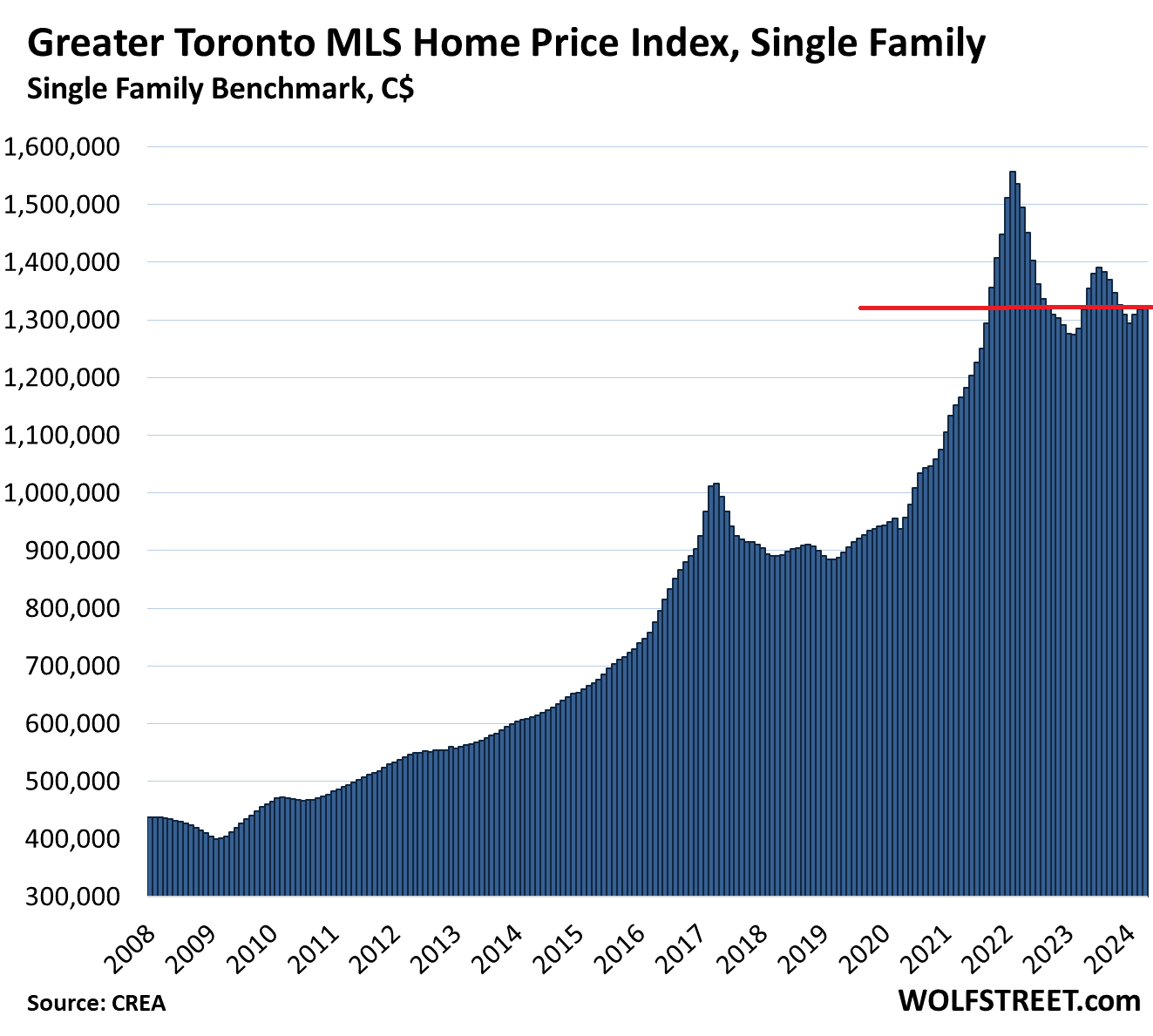
Greater Toronto Area, Condos:
- Month-to-month: +0.3% to $684,100, below November 2021
- From peak in February 2022: -12.4%
- Year-over-year: -0.8%
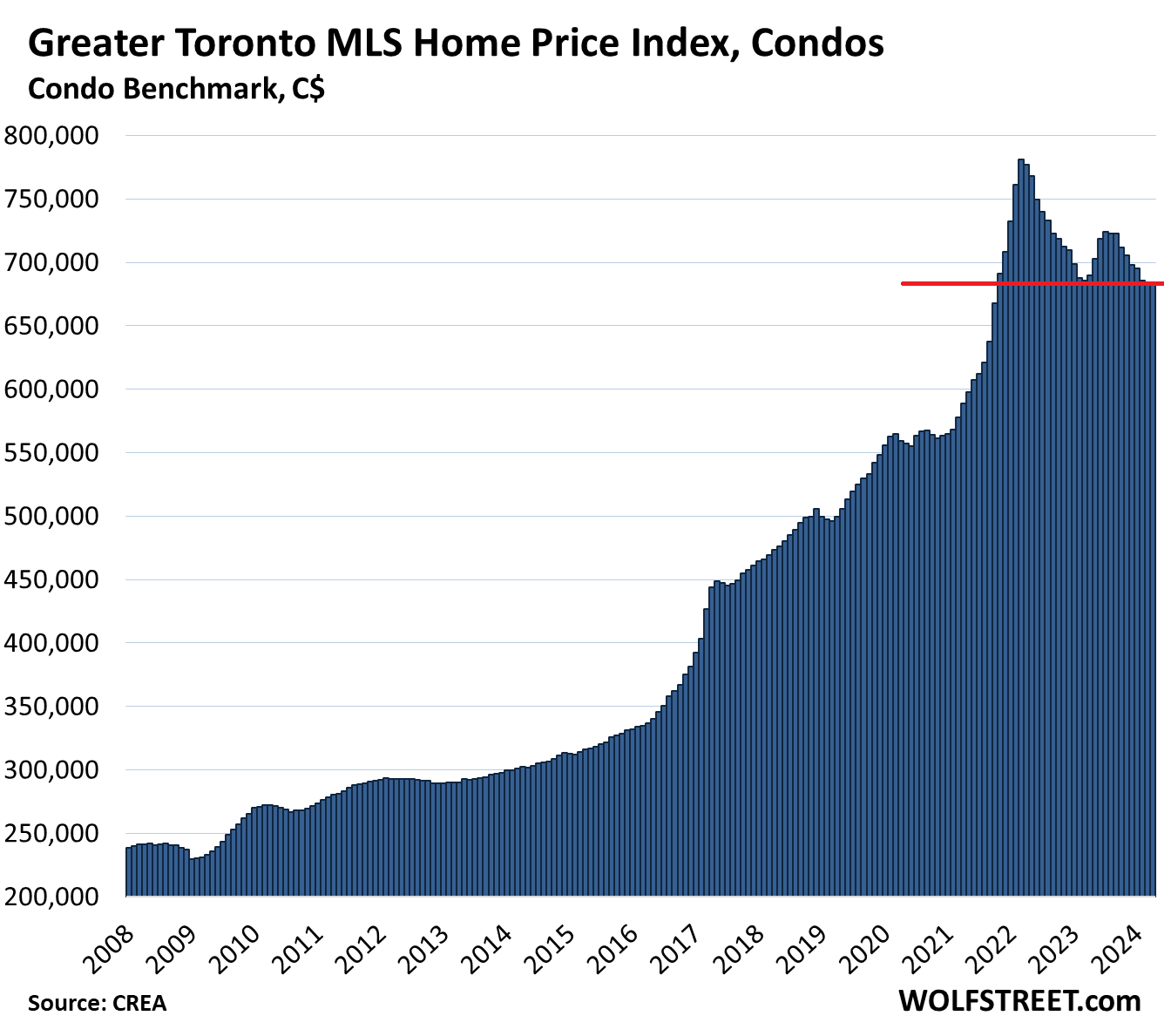
Hamilton-Burlington metro single family houses (in the “Greater Toronto and Hamilton Area”): Single-family benchmark price:
- Month-to-month: +1.2% to $905,900, back to June 2021
- From peak in February 2022: -20% or -$224,400
- Year-over-year: -0.8%
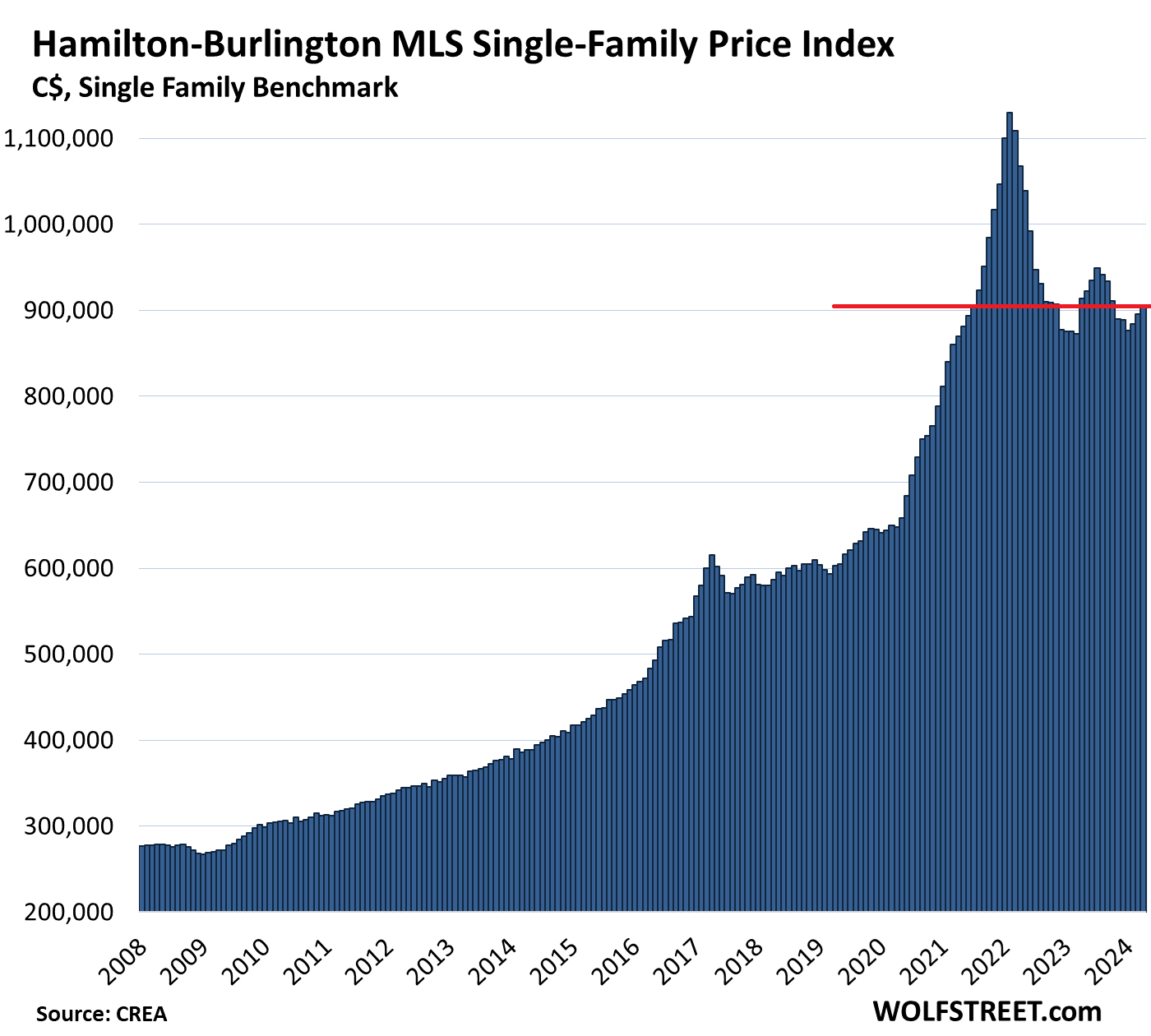
Hamilton-Burlington condos:
- Month-to-month: +0.7%, to $533,200, back to October 2021
- From peak in April 2022: -16.2%
- Year-over-year: -0.9%
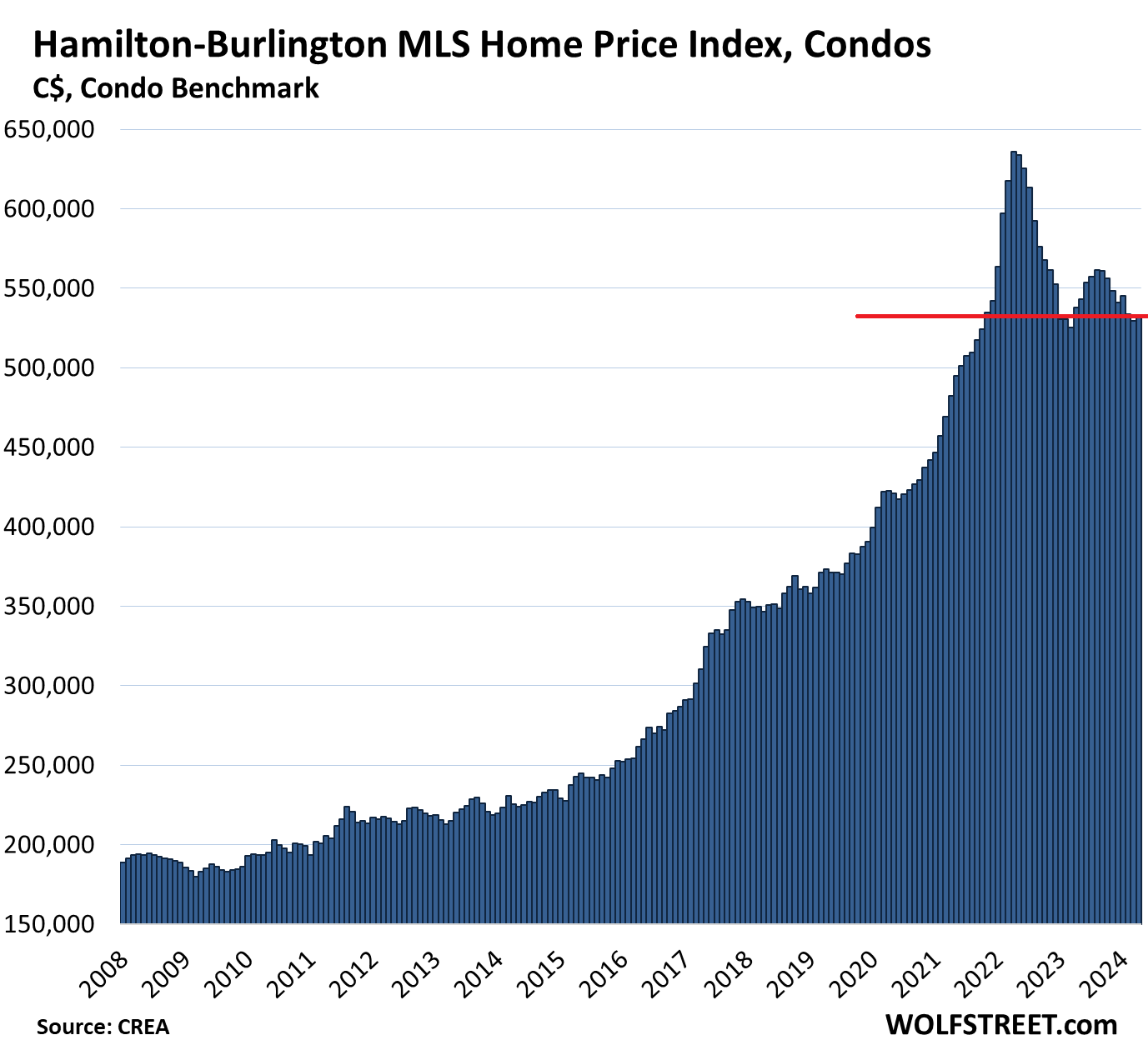
Greater Vancouver single-family houses:
- Month-to-month: +0.5% to $2,004,100, back to January 2022.
- From peak in April 2022: -3.4% or -$59,500
- Year-over-year: +6.5%, the smallest gain since October.
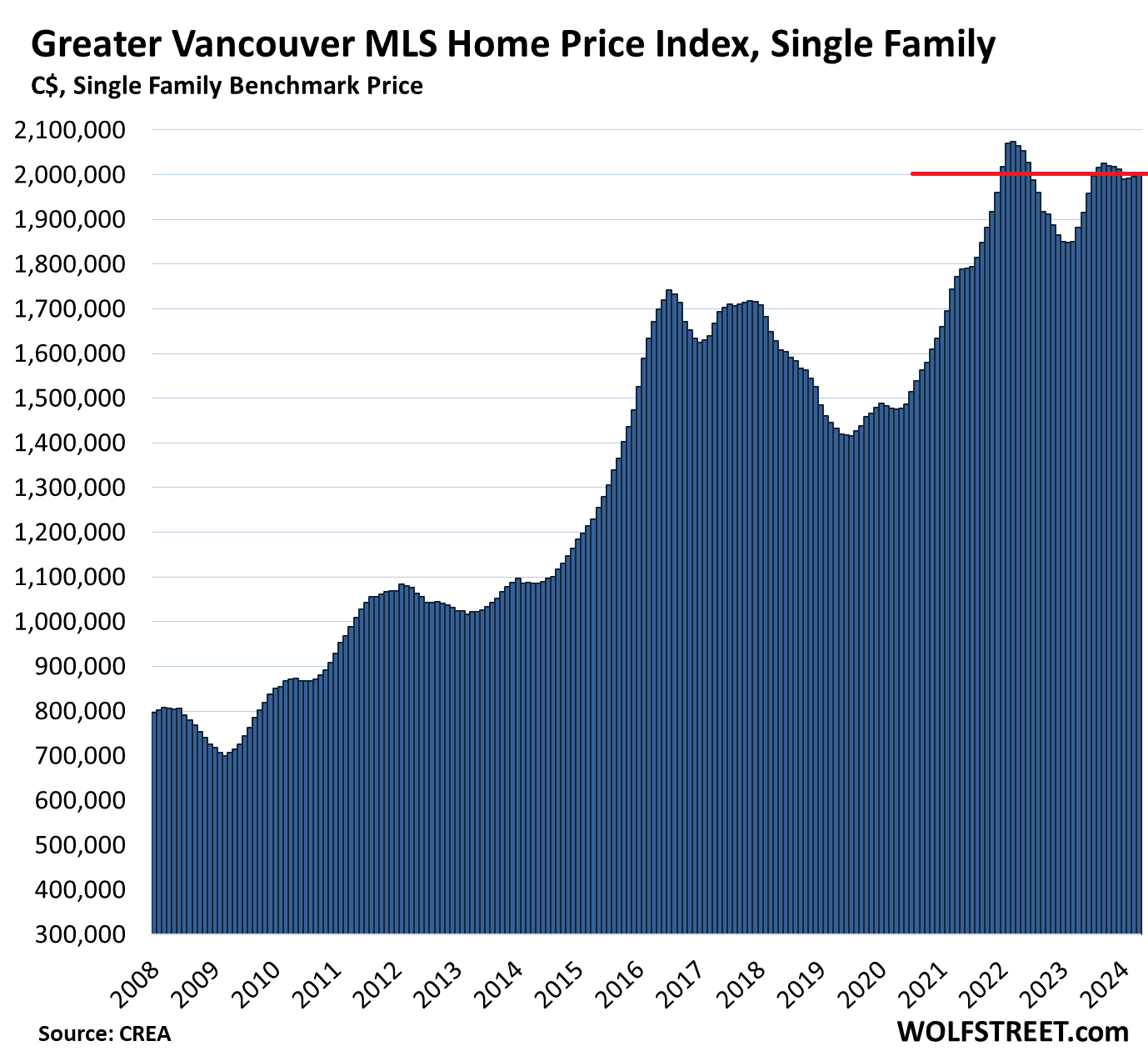
Greater Vancouver condos:
- Month-to-month: -0.2% to $764,800, back to April 2022.
- Year-over-year: +3.5%, the smallest gain since July.
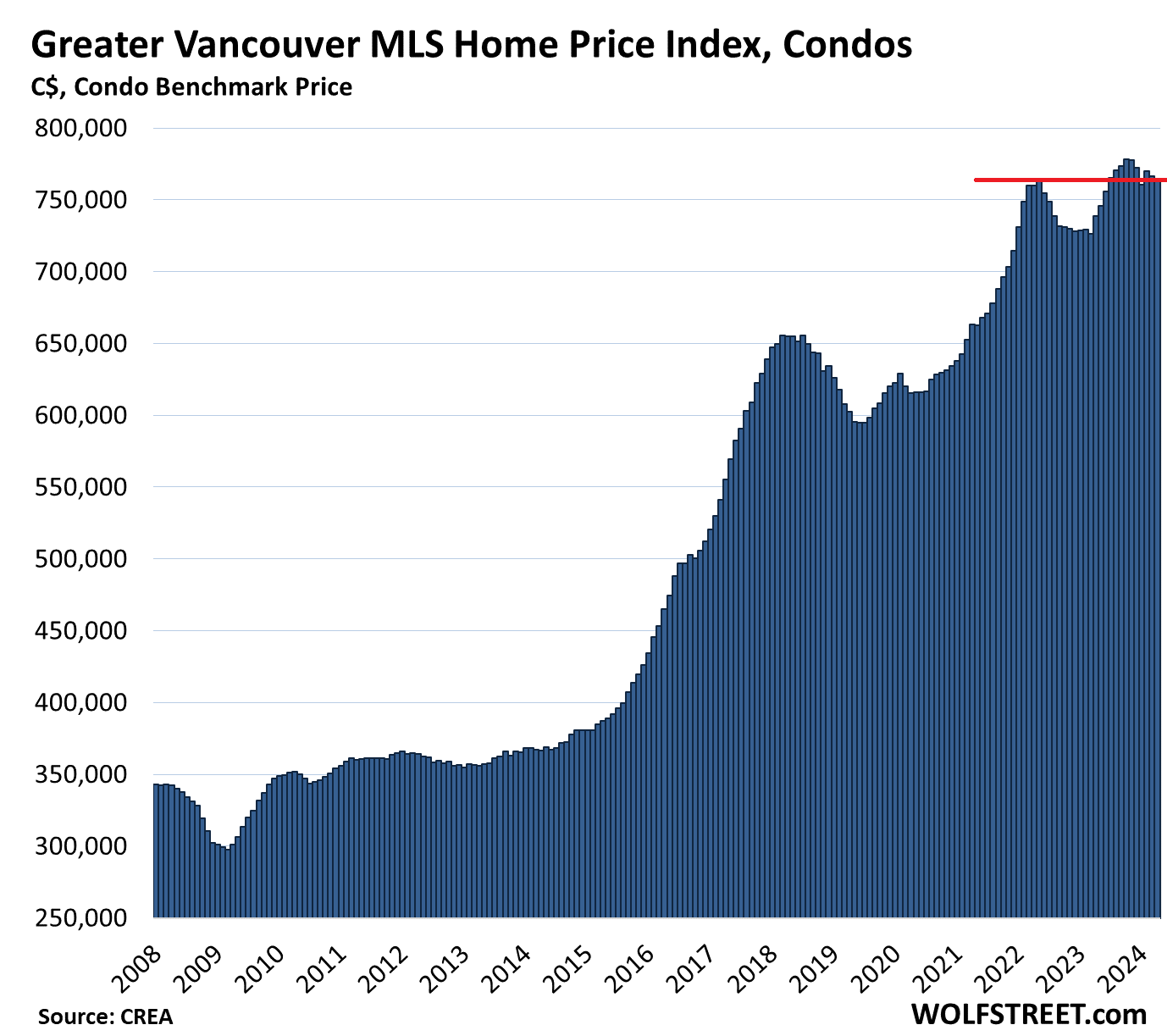
Victoria, single-family houses:
- Month-to-month: -0.1%, to $1,124,900, back to October 2021
- From peak in April 2022: -11.2% or -$142,000
- Year-over-year: -0.1%
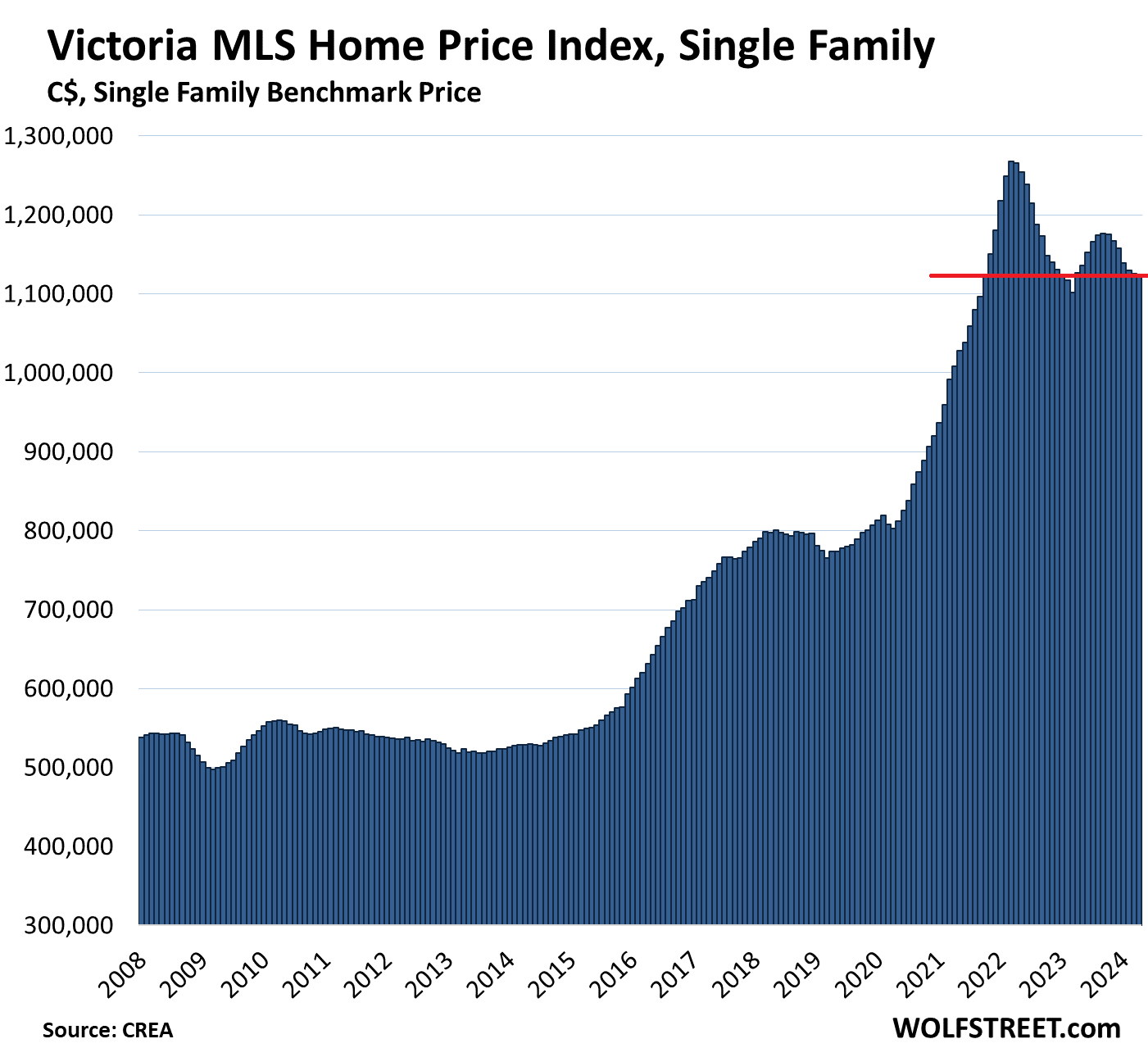
Ottawa, single family houses:
- Month-to-month: +0.2% to $711,800, below June 2021
- From peak in March 2022: -11.1% or -$88,900
- Year-over-year: +2.2%.
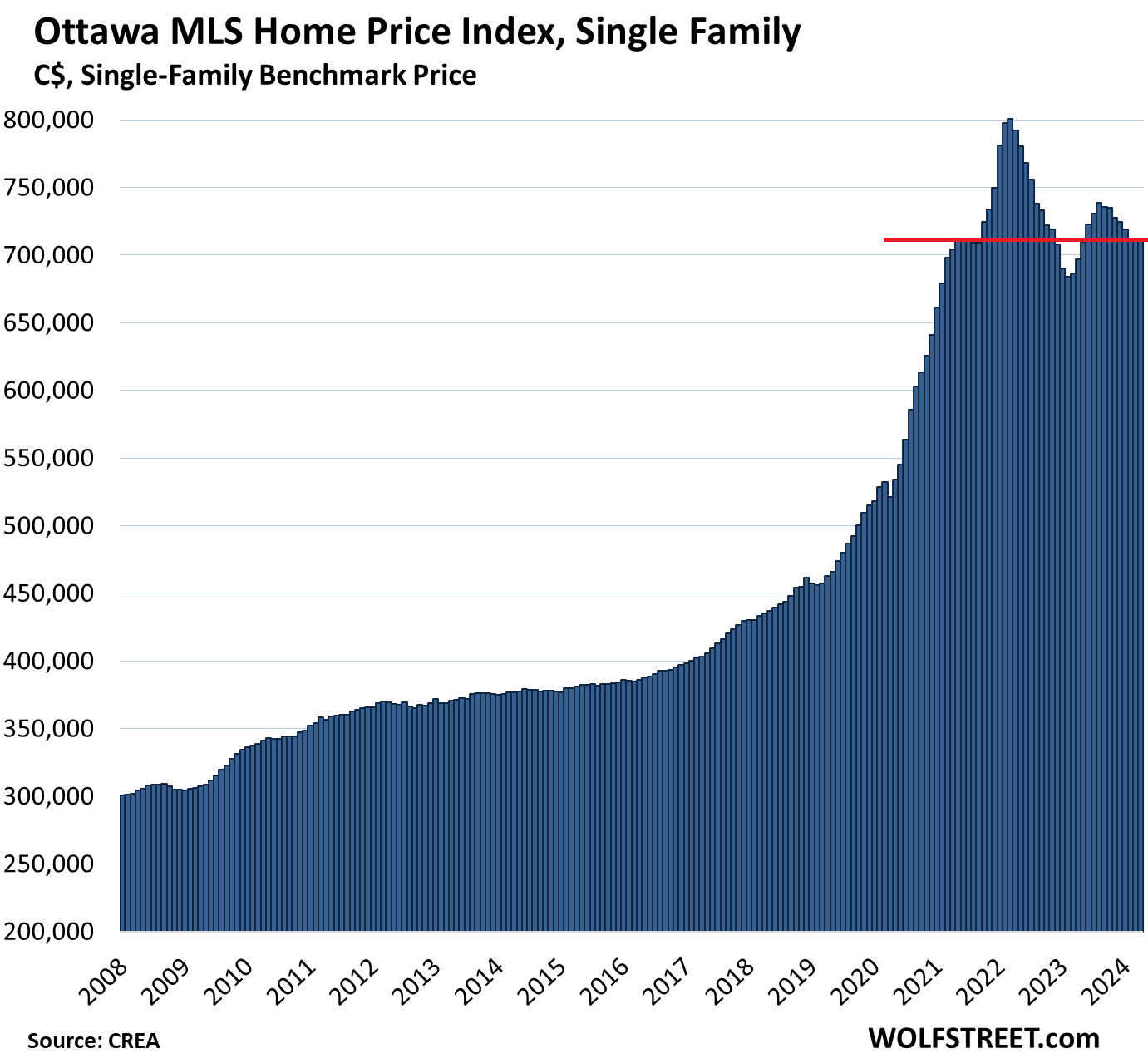
Calgary, single family houses:
- Month-to-month: +0.4% to new high of $668,100
- Year-over-year: +11.9%.
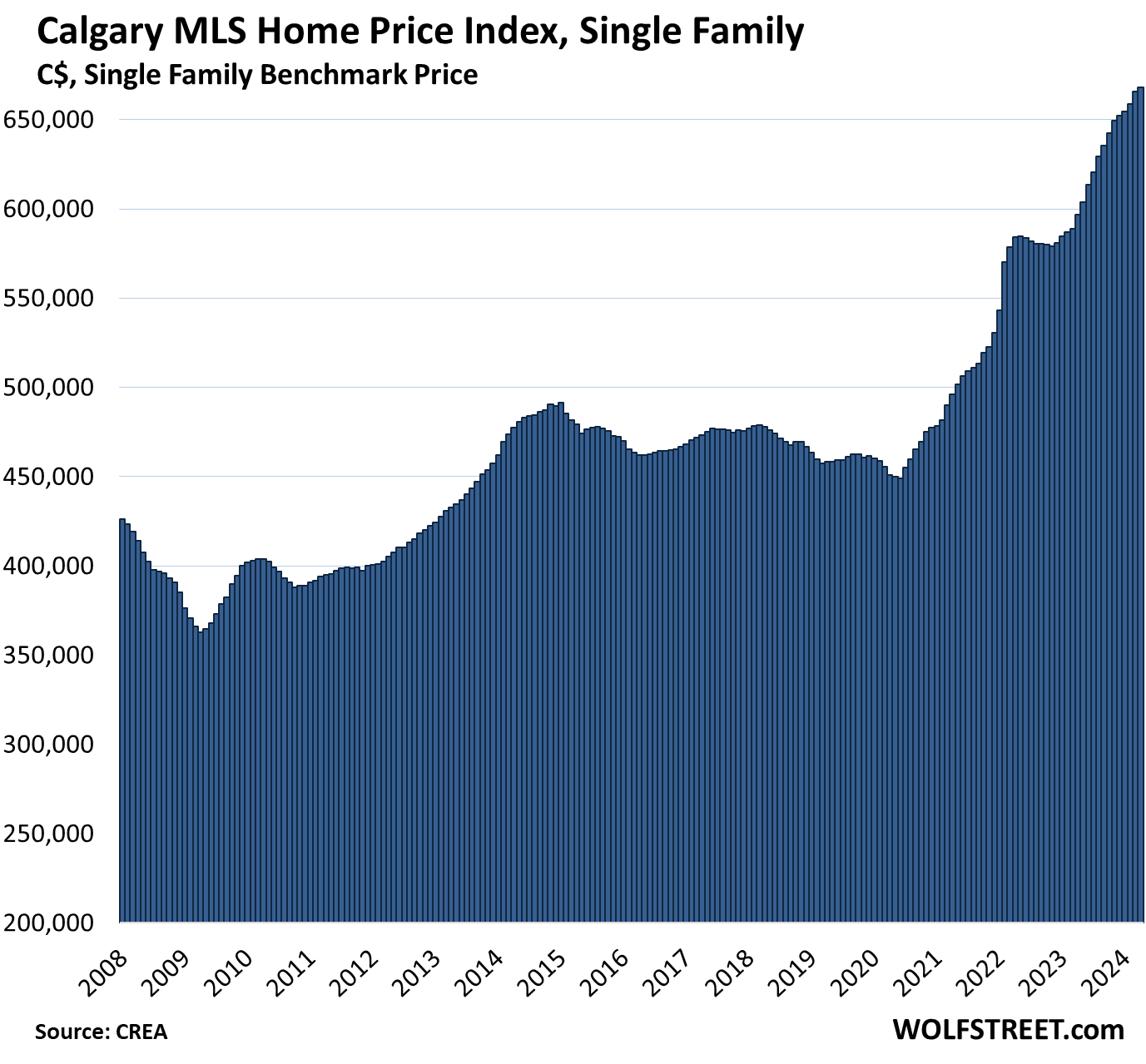
Montreal, single family houses:
- Month-to-month: -0.4%, to $610,000, below January 2022
- From peak in May 2022: -4.2%
- Year-over-year: +3.6%.
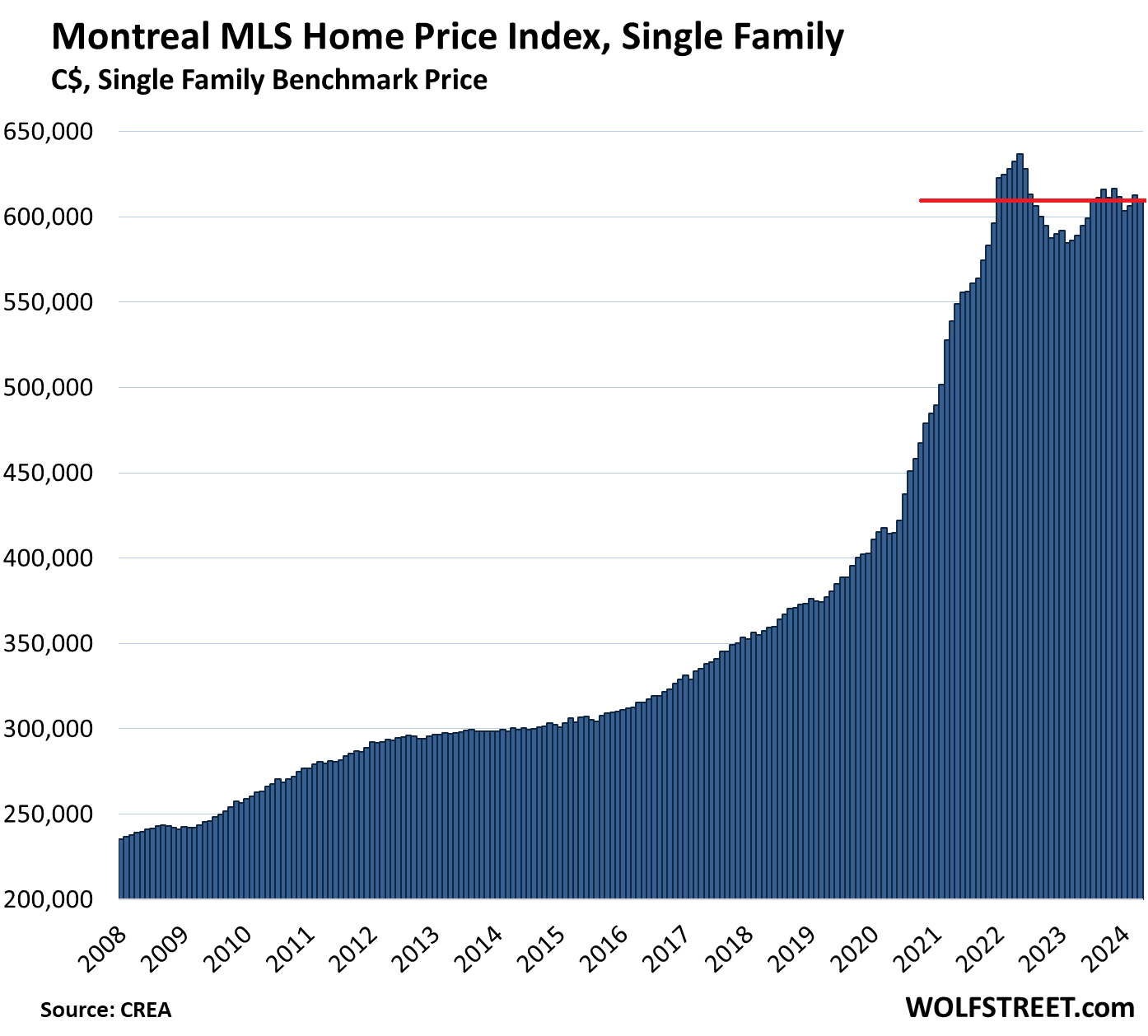
Halifax-Dartmouth, single family houses:
- Month-to-month: +2.1% to $541,200
- From peak in February 2022: -3.6%
- Year-over-year: +4.7%.
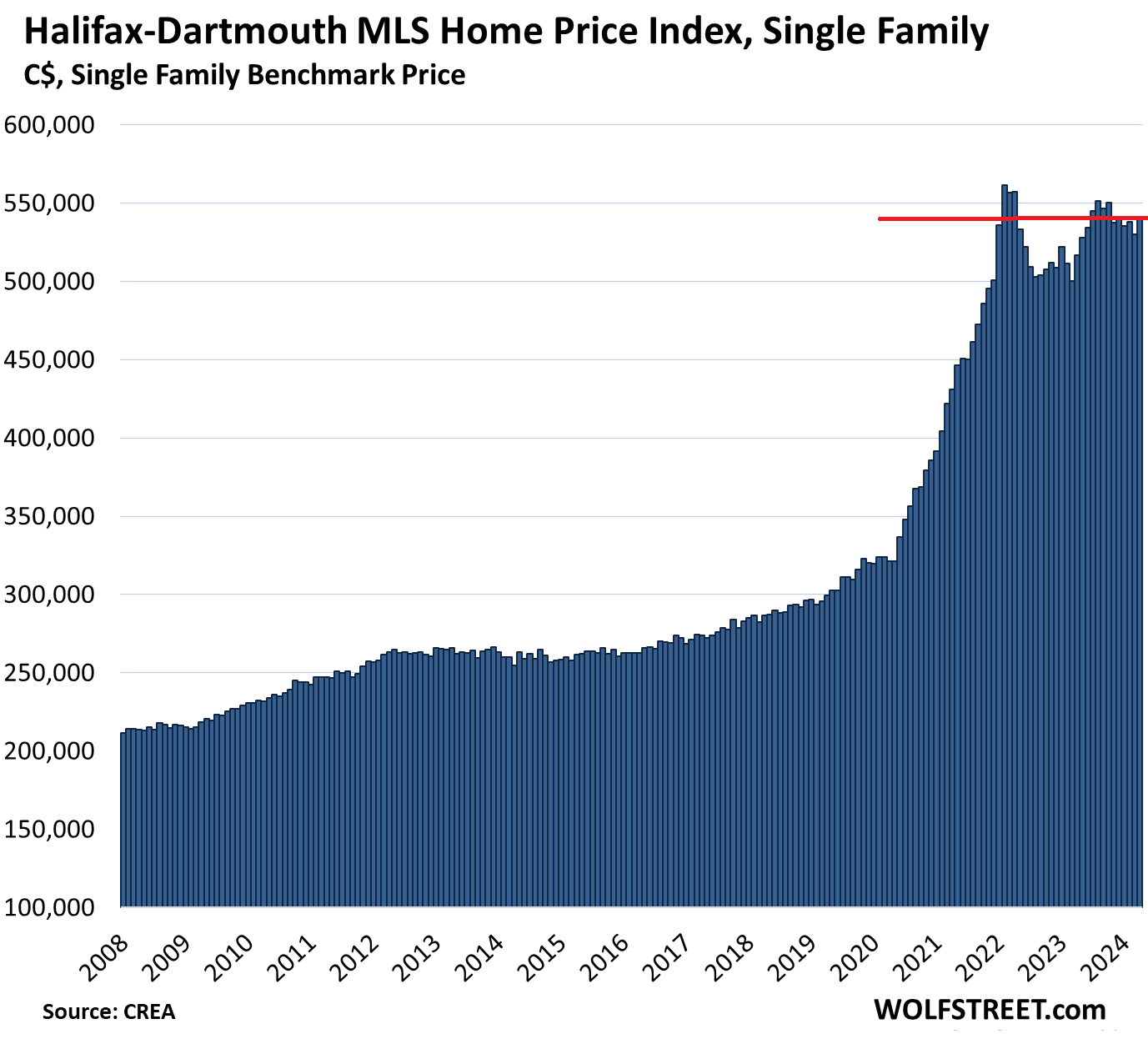
Quebec City Area, single-family houses:
- Month-to-month: +1.5% to $400,600
- Year-over-year: +7.3%
- Eked out new high.
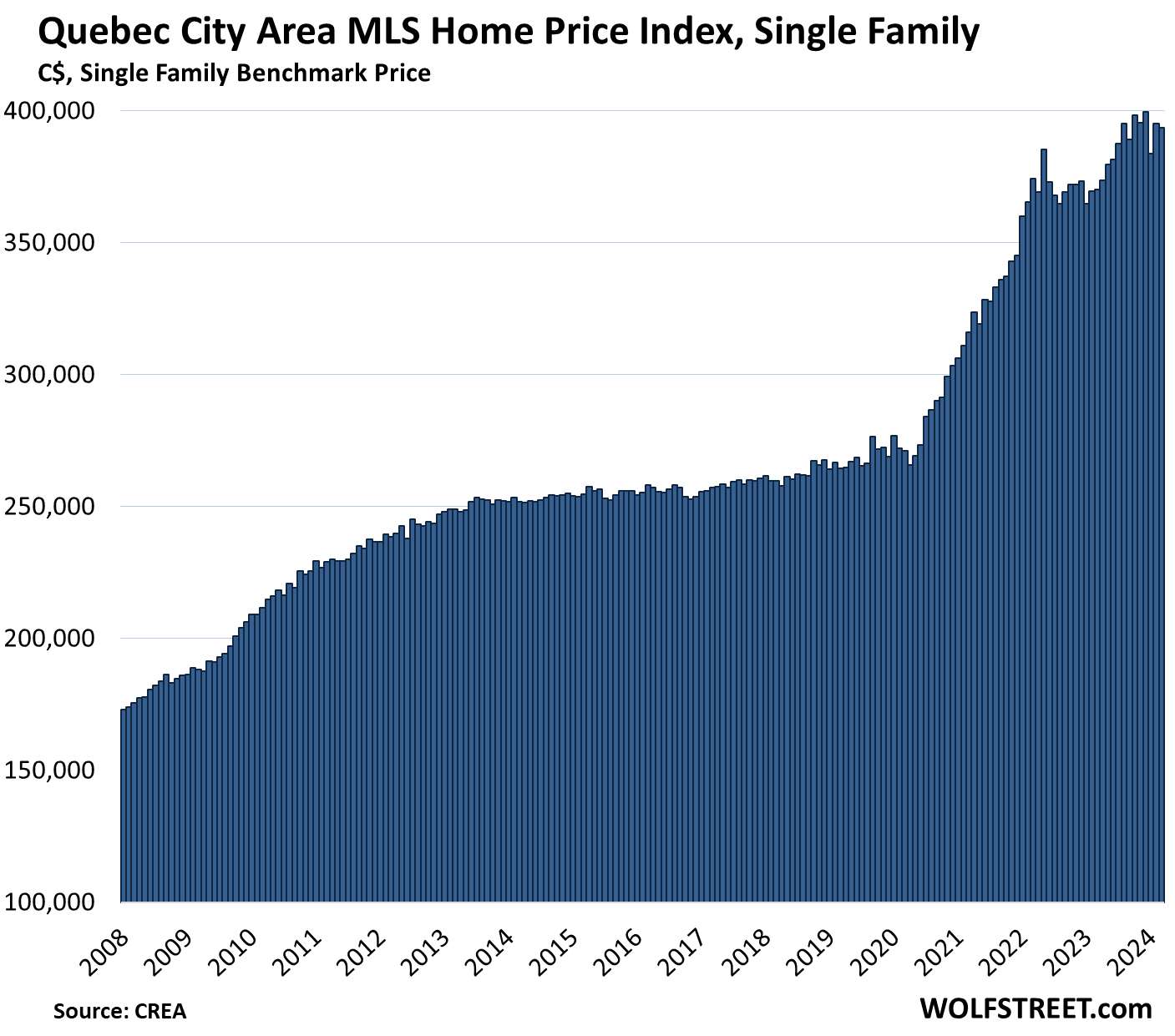
Enjoy reading WOLF STREET and want to support it? You can donate. I appreciate it immensely. Click on the mug to find out how:
![]()


The “rent” is still too high. Wake us up when it’s -50% Wolf!
Rents in Canada are going the opposite way, they’re spiking out the wazoo under the tsunami of immigrants:
https://wolfstreet.com/2024/03/27/amid-canadas-huge-immigration-surge-population-growth-hits-3-2-triggers-10-rent-inflation-even-as-home-prices-drop/
It wasn’t implied to just rent, more generally the cost of living and doing business, but glad you take things literally, because it inspires you to dump more data.
If you own property, you know how much other costs, like maintenance and insurance are going up.
That rent chart is insane. They really need to H1B some lumberjacks pronto, and get some cottages going or something.
It has nothing to do with immigrants, geez.
The price of rental properties increase with initial investment costs (price to buy) operating costs (taxes, insurance, maintenance) so rents must increase by an equal percentage or rental properties cease to exist. First grade math. Basic investment math.
ROI remains the same on rental properties or rental properties disappear. Econ 101.
Come on. I thought WS commenters were smarter
Ok math expert, you ever heard there are two sides to an equation?
LOL. The cost of running a rental property can certainly influence ASKING rents, which may impact actual accepted rents. But only if the tenants can and WILL pay it. Duh.
“…so rents must increase by an equal percentage for rental properties cease to exist…”
Um, yeah, so all those rental owners will just pack up shop and close down if they can’t raise rents? Try that with a multifamily building!
Ask yourself this TripleC-B…. if all it takes is for the landlord to have a reason to raise rents, wouldn’t many/most have done so before just because? Hint, from 1st grade economics: yes.
Depend and supply, haven’t you heard of it?
CCCB,
Seems you don’t understand the immigration shock Canada is going through right now. Population exploded by over 3% suddenly, and they keep coming at an accelerated pace this year because next year there are going to be restrictions, and the housing market wasn’t ready for it. So there is gigantic demand for housing (rentals mostly), and not enough supply, and rents spike. Econ 101. It’s a fundamental economic issue that everyone in Canada now understands, even the government:
I am a small time landlord. Rents are fine.
I remember that you rent out an apartment in Calgary.
But I remember two, three years ago when the oil industry was at the bottom and rent and sales were also at the bottom.
Take advantage of the oil boom before it’s over!
I understand it. We have our share of immigrants in Miami too, but they aren’t the ones moving the market.
It’s primarily the migration of LEGAL citizens flush with cash from other “countries”(lol) like NY, PA, IL, CA that are. Add to that, all the smaller town folks moving to large metros and there’s your answer.
Im so tired of immigration being blamed for all our ills. No, I’m not for illegal immigration, but I live in TX part time also and if all the immigrants stopped working, the economy would crash within a week.
Rent and home prices are not the same.
Canada’s RE markets (Esp. Toronto, Vancouver, Muskokas, some east coast pockets) demonstrate every one of the hallmarks of a speculative mania and bubble on a scale greater than the US in 07’, Japan in 89’, Thailand in 96’.
Fraud. Loose lending standards. Foreign speculation (esp. China). Second mortgage/HELOC leverage. WILD disconnect from household incomes and local fundamentals.
And yet -13% barely scratches the surface. And now we’re bumping along sideways, and even recouping some of those losses.
Up is down. Down is up.
And though
Canada’s lending standards are more strict than in the USA standards are currently and before 2008!
PLEASE do a post about Australia
Howdy No 1. Whats australia?
I think it’s next to Germany?
Nein. It is under Germany!
‘ what’s Australia? The Ultimate Globalist Experiment.
Putting lipstick on a pig describes the Canadian housing market, knowing your old stank pig has made you a millionaire, brings comfort to the Canadian on a cold day.
If I were Canadian I would sell my house, grab the loot, and move in with grandma.
If you were Canadian, you would have done that 20 years ago, and be currently gnashing your teeth about the foregone capital gains…
Maybe so, and grandma would probably kick my sorry ass out.
But look at the CPI rent prices, the chart, it’s almost vertical. How can someone plan for the future looking at a chart like this…unimaginable.
Can’t afford a house, can’t afford rent, maybe I should have been a better grandson. Thanks WOLF.
Eh. Anyone who bought before around 2015 is sitting pretty. Very pretty.
Nicko2: there was a bubble in 2015 already according to all experts at the time.
no capital gains on primary residences in Canada….
No one is planning to movie in with parents or grandparents. They are planning to leave Canada before they are forced to live with parents as the mortgage renewal periods creep closer and the mortgage payments will soon double.
No sign of housing price decline or even moderation of price increases around Metro North Boston. We’re coming off the strongest winter/early-spring price increases ever – with most SFH properties increasing by 9-12% in a matter of 4 1/2 months.
We had an extremely mild winter and that probably plays a role but we’ve also experienced a 2nd wave of foreign buyers from Northern and Western Europe as well as a recent surge in buyers from Israel. This is, of course, on top of the investor-driven buying we’ve experienced over the past four years.
Buy-to-rent remains the prevailing theme.
I thought Trudeau signed legislation preventing foreign investment for 4 years?
I’m referring to the region north of the city of Boston in the USA.
Wow Trudeau is to blame for the Boston real estate market too. I mean I get that the Canadian Government has made several mistakes but the power Trudeau has over the Universe is astonishing.
Re: Helocs: there are 3 million Canuck Helocs with average balance of 70K. I think in many cases the heloc is being tapped to keep the mortgage afloat. The Canuck residential RE exposure is worse than US. No 3 % thirty year mortgages for one thing.
With apology to moderator for unrelated but I’m sure affecting other commenters: I started up computer this AM and here we go again: Microsoft has taken over and booted Google and replaced it with MS Edge. My opening page layout with my faves: CNN, CNBC, WS etc. gone. One time it came with a message: ‘since yr system was built by MS, why would you use any other browser’ or some such rubbish.
I was able to recover because MS dare not cancel Gmail and that brings up G logo on sidebar.
Dear MS: the fact that a customer uses yr operating system does not require him to use only yr apps. Yes it’s too bad you missed Search, and now want to harvest all that data, but don’t force it. It should be and may be illegal to tamper with a competitor’s software.
This is not an endorsement of Google per se, or their data harvesting.
All you have to do is go to setting and change your browser back to Google Chrome or Mozilla or whatever it was in lieu of MS and your setting for it loading are all still there as before.
I hate all the begging and pleading all those guys do to get you to use their garbage. The Internet should have been some great turning point for mankind; instead it’s just complete and utter trash – one giant ad. I hate it all.
(And I’m a Systems Engineer…)
I’ve never had that happen. With every periodic update of Edge, they ask in the intro sequence if you want to make Edge your default browser.
Tip: answer “Not Now”.
Google is rubbish. I dumped it for Edge/Bing years ago. Google searches are driven by ads and does not give you anything useful.
I went back to google as few weeks ago for a specific reason and seems the search results are even more trash than before. Even looks like a 2010 webpage.
Small request which you can ignore. Stop referring to detached houses as as ‘single-family’ for the Vancouver chart. Families can’t afford to live in detached housing, families live in small condos and apartments. Detached houses are owned almost exclusively by elderly people who bought them decades ago.
If you don’t believe me, check the 2021 census data – very few kids growing up in detached houses, and with the average price to buy one at 2mil, how could you expect anything else.
Yeah, it’s a nit-pick. But this notion that detached housing is the American/Canadian dream filled with young couples and their kids behind white picket fences, supports a lot of the pernicious restrictions on every other kind of housing that is causing the housing shortage and stupidly high prices that you so excellently have charted above.
“If you don’t believe me, check the 2021 census data – very few kids growing up in detached houses”
I don’t. Link?
Here is a map of Vancouver showing the number of toddlers per census tract. It looks like a map of the skytrain (subway) network, tracking where high density developments have been permitted:
https://censusmapper.ca/maps/3359#11/49.2389/-123.0311
Lots of ‘young adults’ live in their family home. It’s very common in Asia, no shame in it. Sharing equity is the smart move in today’s world.
There was an ad many years ago showing the last kid leaving home, with the parents at the door waving goodbye, with sad faces.
After the door closes, they celebrate.
Fed Mester says her business contacts give her the idea the economy is stronger than appears…….
I’am shocked……just shocked to learn that the extra 3 trillion sloshing around in the economy is causing business to expand.
I remember sitting in Econ 101 in 1970……..something to do with economics…..of course some of the fomc board and their friends were all burning down campus town back then and smoking hash.
Isn’t it wonderful in America where even the smokers get a great job doing something as meaningful as raising and lowering rates. If she loses this job I suppose she might be qualified as a drapery saleslady….raising and lowering drapes. What a country.
No high paying jobs and no high income but still the Canadian home prices are so high.
It really is disgusting how the policy makers can screw the common joe/future generations for their own greed.
Canada used to be a beautiful country. Sad :-(
No high paying jobs? What nonsense. I have plenty of Canadian relatives who have high paying jobs. Others do not. It’s a mix.
How many of the 500,000 permanent residents will find a good paying job in their field this year? A few ppl with good jobs is a drop in the ocean compared to the economic reality.
I wager new Canadian immigrants work twice as hard as ‘old stock’ Canadians. I know plenty of immigrants who toiled for years, getting their certifications up to snuff, and now own homes, raising families, and established careers with well paying jobs.
Most of my friends make at least a million plus in USA.
Does it mean that all Americans make this much money ?
If you make housing an investment, don’t be surprised if it behaves like an investment (volatility).
If you make housing a can’t-lose investment, don’t be surprised if you get a bubble.
The complicating factor is housing has intrinsic value – it’s shelter against the elements and a place to stay. Plus price supports / socializing losses by the government is also a complicating factor.
I think the complicating factor from the government and central bank’s perspective is the timing and scale of the housing bubble and their desired solution of growing the economy (and revenue) through population and job growth. The last stats-can labor force survey was seen as a blockbuster and still barely lost ground to unemployment because of the level of population growth. Mortgage renewals aplenty this year and 2025 at considerably higher rates. Won’t be able to simultaneously keep inflation down and minimize pain to those renewing – with the increased costs of new builds it will be interesting to see at what rate and price levels housing is deemed affordable again to consumers in the market. Wouldn’t be surprised to see amortizations extended further.
The building isn’t worth much, it’s the land. The world has ever more people, and ever more people want to come to Canada. HENCE….PRICES WILL NEVER COLLAPSE.
Never say “Never”.
The only sure thing in this world is that one day we will all leave it
“Collapse” is a funny word. Buildings collapse, for sure. Banks collapse regularly. But with prices, it’s in the eye of the beholder whether it’s a dip, decline, plunge, or collapse. So nicko2 may well be right that in his vocabulary, prices will “never collapse.”
Yes, wordplay is aerobatics!
If nisco2 means that prices will never fall, he is wrong, because they have already fallen and will probably fall further.
If he means that prices will never fall to zero, yes, he is right, as long as the world exists, prices will never fall to zero.
But this article of WR is saying the opposite. The prices have come down and is coming down.
Chuck Marohn in a recent book used the analogy that neighborhoods today are like an oil field; the value is all in the ground, the scarcity value of a nonrenewable resource, and the house is the drill bit we use to access it.
My current bet of what’s going to prick the housing bubble is an insurance crisis caused by the climate. It’s the only thing that sidesteps the consensual hallucination. Apparently we’re about to test that theory in Florida in about a month here. My bet is that the collapse of a statewide market would have global effects similar to the financial crisis, through securities and the the reinsurance market etc.
Avg rent in Toronto area is now $2400 for a 1 bdrm, that translates to >50% of net median income.
Housing costs are threatening any progress made on the inflation front because it’s the single biggest line item for everyone.
The market is in a holding pattern now. Sales are slow and inventory grows but willing buyers can’t do anything because the mortgage is well beyond what they’re able to qualify for.
Meanwhile government tries to serve two masters at once – keeping valuations high for the millions (of voters) that want to treat their home like retirement nest egg, and also providing affordable housing for the millions that can’t afford squat.
The RCMP even published a report that flat-out claimed housing costs may cause civil chaos.
Yet everyone clamours for the rates to drop. I’m getting whiplash from the back and forth.
For all the Americans watching from the comforts of this own homes, that translates to $1752 in US dollars. It’s not much different from the rents in Austin which are, thank God, deflating.
Frigging spell checker. Not this homes. Their homes.
Then translate Canadian dollar wages to USD then. Can’t compare Canadian rent prices to USD without considering lower wages in Canada and 1,000 people lining up for a US$11/hr equivalent job in the Toronto region.
The stats are the stats and speak for themselves. Wolf does a great job providing them for readers.
Wages are very high where I live, provided you have a certified trade or a needed skill. For example, I know several HD mechanics earning well over $100K per year. Electrical varies from $50 per hour to $85 hourly wage…charge out rate $100/hr which includes travel time. Plumbers very well paid as are mechanical and refrigeration techs due to the surge in heat pump installations.
June 1st, minimum wage rises to $17.60 per hour.
Anecdotal observations: My son in law selling a very nice newish patio home just out of probate. Actual hardwood flooring, 3 bedroom, new kitchen, heat pump, etc. No offers at $690K, dropping the price today? to $650K. Location is 30 minutes from Victoria. I live rural and seeing a trend recurring of nothing selling at all. Nada. I have seen this situation before 20 years ago when places would be on the market for several years. However, many new builds on the Island, absolutely scads of new apartments going up on Vancouver Island by two national (main) developers, West Urban and Seymour Pacific….. with fenced off lots for additional new developments in waiting. Air B&B outlawed now in many towns over 10K population except in primary residences, and no restrictions allowed on new 4 plexes in residential areas. NIMBY is restricted for new development of 4 plexes.
It takes months to turn the rental ship around, but it is changing here out west, despite the influx of retirees and folks with money.
And location is key. I live on the water and could sell my house in days. In the Village….same house might not sell for years. My in laws neighbour had an offer on waterfront south of Courtenay in less than one week. But the market is slowing for sure.
Son owns two houses at age 40, value 2X what is mortgaged. My daughter is 44 and is mortgage free. She lives south of Nanaimo in the nice town of Ladysmith. These are working folks who got into the market 15 years ago through the fixer up route…bought what they could afford and stayed put…resisted trading up.
The housing market won’t fall if the China real estate market comes back with rate cuts around the world. More listings in Canada can be attributed to the new capital gains tax which kicks in this June 25th. All capital gains above $250,000 are taxed at 66 percent instead of 50 percent. Places like London, Ontario which are almost 90 percent investor owned are seeing a big increase in listings.
Being that Vancouver is Canada’s top area, I am surprised that the median SFR price is only $2,000,000 Canadian which is less than $1,500,000 USD. That is high, but not unreasonable. In the US, a $1,500,000 median will NOT get you a SFR in a premier US zip code. It is not as bad as I thought it was up there.
“Greater Vancouver” is NOT a “premier zip code.” It’s a huge densely populated diverse metropolitan area, with some very expensive areas and some cheaper areas. What you’re looking at is the median price of a benchmark house in Greater Vancouver, not the median price of the most expensive neighborhood.
Vancouver is also constantly investing in it’s future; ie. public transit, green spaces ect…. look at qualilty of life metrics; Vancouver is top of the charts for N. America.
I live in southwestern Ontario and watch the market closely.
Asking prices are all over the place, but too high or in need of repair stays listed.
The bulk of sales seems at significant lower price levels then a year ago, now about 700,000 for a nice move-in ready housein a good area seems to sell. In the old part of town a year ago few 100 year houses with need for repair sold within a week for around 400,000. Similar listings around 350,000 stay listed for a while now.
Plenty of waterfront properties from cottages to newly built mansions are on the market and stay listed.
Here the price-trend is down.
I know these aren’t Canada specific questions but is what’s happening in Canada, the canary in the coal mine for the US? I’m seeing lots of articles out now stating that rent prices have now outstripped wage growth in the US. What does that do for/against the large wage gains some people have been experiencing to offset inflation. And is this in fact even true, that rents have done this?
We do landlording in a small town in Western Canada, the demand for rentals is high especially from newcomers. The wages are irrelevant , we are getting dozens of high quality prospective applicants for every vacant unit, who wish to secure housing before they arrive and search for employment. The demand is pumping up RE rents and prices in Western Canada.
Local long term tenants and young people are very unhappy about sky high rents.
> we do landlording
no businesses started in canada.
no real work done.
landlords.
govt contractors.
outright fraud and thieves.
that’s about it.
georgist,
FYI: as hard as this may be for you to grasp, but there are actually manufacturing plants in Canada, including auto manufacturing plants by Toyota, Ford, GM, Honda, and Stellantis (maybe you drive one of the Canada-made cars and didn’t know it?). And there are factories that make components for the auto industry globally. That’s just an example.
In Western Canada an avg family income is 100K+, professionals and skilled trades can make 200K+. Noticeable transfer of capital from India to invest in residential housing. In my hood homes under 1 million are selling above the asking price within a week. Flipper across the road is re-renovating already renovated house. Next door – a first time amateur flipper is doing a major reno paying above the avg prices in order to have this project completed asap. No signs of financial distress in my hood. Everybody is talking about investing in RE and projecting insane cap gains.
On the local radio frequent ads from the trusties in bankruptcy.
Anything flipped for a profit and sold within one year is taxed as income not as a capital gain. Renovators have vanished since the new tax change was brought in.
Hey Tony,
Being exempted from capital gains from declaring and living in a primary residence (minimum 12 months) is a bit of a joke. I worked in new home construction in a former life for a number of years. To be a speculating house flipper and pay very little taxes is quite easy in Canada. Most developments offer cheaper prices in the early phases/stages and unit price will appreciate as the development progresses to end phases. Most developments take years – you’d arguably want to sit on a unit from an earlier phase for 2 to 5 years anyways, as the area is developed around it and the unit price appreciates. As for existing homes, it will “localize”; alot will depend on the individual city/municipalities housing prices and local jobs and wages. Don’t think interest rates will be going back to pre covid and without government juicing mortgage credit conditions the market will likely react slowly, a slow depreciation and stagnant to moderate sales volumes with higher listings (like what’s happening now).
The graph used to describe Vancouver condos is either mislabeled (it says “Greater Toronto MLS Price Index”), or you put the wrong graph there. I think the latter since the numbers dont match with your narrative.
Wrong chart got in there (duplicating the Toronto Chart above, as you pointed out, and as the chart said). Correct chart is in there now. Nothing to do with “narrative” — that stupid one-liner marred your otherwise valid and appreciated pointer.
Twin peaks isn’t just a creepy tv show, it’s also a terrible economic marker. Just go look up the pattern for an economic bubble.
I hope we’re better prepared than Japan was in the 90s. On the bright side, if housing does go kaput, maybe it’ll stay low for years to come.